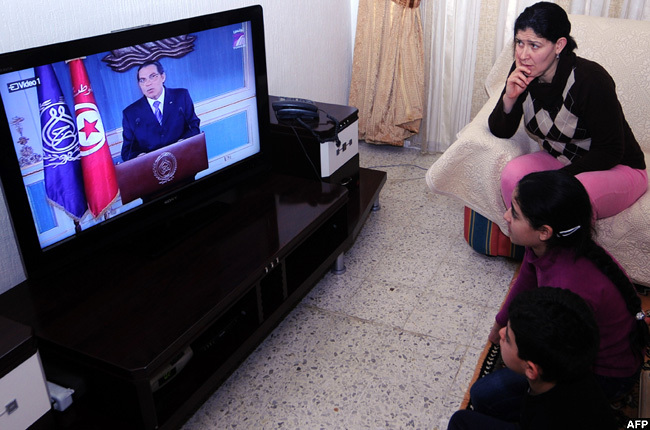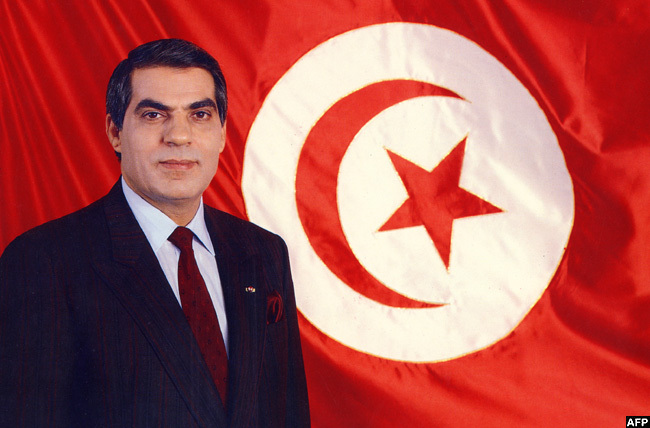Tunisia's ex-president Ben Ali dies in exile
His rapid departure in 2011 sparked a string of similar uprisings across the region, toppling Egyptian and Libyan strongmen Hosni Mubarak and Muammar Gaddafi.
POLITICS
Former Tunisian president Zine El Abidine Ben Ali, the first leader to be toppled by the Arab Spring revolts, died Thursday in Saudi Arabia, Tunisia's foreign ministry told AFP. He was 83.
"We had confirmation of his death 30 minutes ago," the ministry said, without giving further details.
His lawyer, Mounir Ben Salha, confirmed the news, citing family members and Ben Ali's doctor.
Ben Ali, who ruled his North African country from 1987 until 2011, was viewed by some as a bulwark against Islamist extremism, but faced criticism for muzzling the opposition and his reluctance to embrace democracy.
Eventually, growing frustration over unemployment and high prices snapped.
In late 2010, the self-immolation of a young trader sparked major protests that rocked the country and sparked a deadly clampdown.
Ben Ali fled Tunisia for Saudi Arabia on January 14, 2011.
His rapid departure sparked a string of similar uprisings across the region, toppling Egyptian and Libyan strongmen Hosni Mubarak and Muammar Gaddafi.
The turmoil triggered what was to become Syria's devastating eight-year war.
 January 1, 1986: Former Tunisian President Habib Ben Ali Bourguiba (R) shakes hands with his then-prime minister Zine El-Abidine Ben Ali
January 1, 1986: Former Tunisian President Habib Ben Ali Bourguiba (R) shakes hands with his then-prime minister Zine El-Abidine Ben Ali
Pyjamas in exile
In mid-2012, Ben Ali was sentenced in absentia to life in jail for his role in the deaths of protesters during the uprising that ousted him.
Little information has emerged on his life in exile.
Photos posted on Instagram in 2013 showed the former strongman smiling in striped pyjamas.
Rumours of his death had circulated several times in recent years.
A week ago, Ben Salha said the former president was in a "critical condition", before denying reports that he had died.
"He is not dead, but his state of health is bad. He has left hospital and is currently being cared for at his home -- his condition is stabilising", the lawyer said at the time.
Prime Minister Youssef Chahed said last week that on humanitarian grounds Ben Ali could return to die in his own country -- "like every Tunisian" -- should he wish to do so.
Ben Ali is survived by six children; three daughters by a first marriage and two daughters and a son by Leila Trabelsi.
 January 13, 2011: A Tunisian family watches TV as Tunisian President Zine El-Abidine Ben Ali gives his resignation speech
January 13, 2011: A Tunisian family watches TV as Tunisian President Zine El-Abidine Ben Ali gives his resignation speech
A career soldier, Ben Ali took power on November 7, 1987 when he toppled Habib Bourguiba, the ailing father of Tunisian independence who was by then reported to be senile.
Tunisians, including Islamists, hailed his bloodless, non-violent takeover.
He went on to make Tunisia a moderate voice in the Arab world while Western governments viewed him as an effective bulwark against extremism despite criticism of his slow move toward democracy.
Ben Ali was also sentenced in absentia to misappropriating public funds and ordering the torture of army officers who allegedly led a coup attempt against him.
Tunisia on Sunday held a presidential election, in which two outsiders -- law professor Kais Saied and detained media mogul Nabil Karoui -- made it through to a second round run-off.
The country's first post Arab Spring democratically elected president, Beji Caid Essebsi, died in July aged 92, bringing the first round of the presidential polls forward by several months.
_______________________________
BEN ALI AT A GLANCE
Key dates in the life of Tunisia's ex-president Zine El Abidine Ben Ali, who died on Thursday in Saudi Arabia, where he has lived since being ousted in 2011.

Early life
Ben Ali is born into a modest family in the town of Hammam-Sousse on September 3, 1936, when Tunisia is still a French protectorate.
He is 19 years old when the country achieves full independence, in 1956.
After military training in France and the United States, he enters army intelligence and is appointed minister for national security in 1985.
He moves up to the interior ministry the following year and the post of prime minister early in 1987.
Ousts father of independence
On November 7, 1987, Ben Ali takes power after having Habib Bourguiba, the ailing father of Tunisian independence, declared mentally unfit to rule.
The bloodless coup comes after several years of growing civil dissent exacerbated by economic difficulties, along with increasingly erratic behaviour by the autocratic Bourguiba, who in 1975 had himself declared president for life.
In 1988, the constitution is amended to rule out life presidencies, limiting presidential tenures to three terms each lasting five years.
Elections
In 1989, Ben Ali, the single candidate, wins presidential elections with 99.27 percent of the vote.
Five years later he is re-elected with 99.91 percent. The opposition enters parliament for the first time since independence in 1956.
In 1999, Ben Ali organises the country's first multi-candidate presidential election. Faced with only token resistance from two challengers, he wins with 99.44 percent of the vote.
Constitutional change
In May 2002, he wins a referendum on constitutional changes allowing him to stand for a fourth term, which he wins in October 2004.
He is overwhelmingly re-elected to a fifth five-year term in 2009, albeit with a score dipping for the first time just below 90 percent.
Fall of Ben Ali
Ben Ali quits on January 14, 2011 after weeks of deadly nationwide demonstrations sparked by the self-immolation of a fruit seller who was protesting police harassment and unemployment.
He is the first leader to stand down in the Arab Spring which sweeps the region, fleeing after 23 years in power to Saudi Arabia, where he lives until his death.